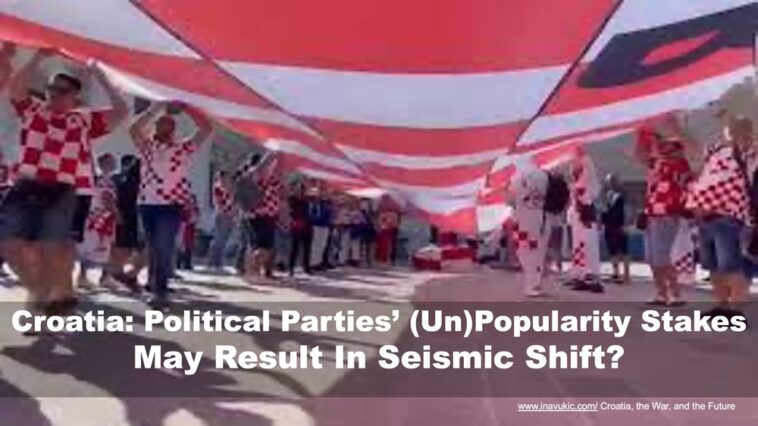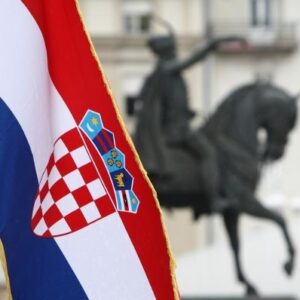2024 is widely touted as the year that will test democracy across the globe and produce seismic political shifts in several countries. Globally, more voters than ever in history will head to the polls as at least 64 countries (plus the European Union)—representing a combined population of about 49% of the people in the world—are meant to hold national elections, the results of which, for many, will most likely prove consequential for years to come. As Parliamentary, Presidential and European Parliament elections will occur in Croatia during 2024 the country will have a mega-election year but how seismic election results will be is anyone’s guess at this stage.
Certainly, the opposition of all walks of political life and orientation are increasingly calling for parliamentary elections “now”! That has also been the message at the Saturday 17 February 2024 anti-government “Enough! Elections Now!” somewhat loud but rather toothless (and not likely to be a prelude to some seismic political change) protest organised by 11 left-liberal opposition political parties currently represented in the Croatian Parliament with seats in it. Two of these political parties were SDP and Možemo (all closely associated in mindset and personal history with former Communist league) who hold the second and third place in the CRO Demoskop political popularity stakes, the first place held by the ruling HDZ but all three below the 30% mark each (HDZ under 27%, SDP under 16% and Možemo under 9%).
While the HDZ/Croatian Democratic Union Party has always positioned itself on the Conservative or centre-right wing of politics it is not convincingly perceived as such by a vast majority of voters in Croatia, particularly by those leaning towards the right spectrum or abstain from voting altogether. Such perception would largely be ascribed to HDZ’s coalition in government with SDSS (Serbian Democratic Independent Party) closely connected o the Serb-rebel aggression against Croatia in the 1990’s. Hence, with HDZ out of the formula, today’s right-wing or conservatism in Croatia despite a wealth and a plethora of other political parties subscribing to patriotism and values of the 1990’s Homeland War, is in a permanent crisis, unlike, say, Germany, where the almost a meteoric rise of the Alternative for Germany (AfD), which has of recent caused rivers of anti-AfD protests in Berlin and across Germany, several ruling politicians labelling it Nazi, but according to regular popularity polls now ranks higher than each of the three ruling parties. Labelling an ultra-right wing political party has become somewhat a “fashionable streak” or populism among those on the left. Illegal migration into Germany has, by all indications, overwhelmed the German people and presented as a serious threat to the life and prosperity Germans have enjoyed for many decades. The right-wing politics in Germany have made it their priority to deal with this threat, whether real or perceived, and, if needed, to the harshest of levels such as deportation of illegal migrants from Germany by their hundreds of thousands; a goal doomed to fail but, nevertheless, appears to attract voter attention.
In Croatia classical right-wing parties have been gradually collapsing during the past two decades as well as in recent years and attempts of revitalisation of some have often been seen as brave and commendable albeit watched upon with curious caution by many. This is most likely because the collapse of classic right-wing political parties in Croatia has been used by populists of all kinds, false patriots, false conservatives, who in their platform of “fighting against corrupt elites” often used the arguments of right-wing policies. Croatian history and its anti-communist aspects as well as the increasingly disturbing level of both illegal migrants and work-contract temporary residents from culturally and religiously incompatible nations has caused much public discord and fear. An air of uneasiness is pulpable in Croatia, and it is not likely to emerge with a more promising political pull. Even the most numerous and relatively most popular political party, HDZ, doesn’t even achieve a 30% mark in popularity survey results.
Such pressures and perceived threats as are illegal migrants, overwhelming presence of foreign work force and brain drain own could become a fruitful ground for change away from the HDZ or SDP relative majority achieved as a prerequisite to form government. However, that change to occur if things remain the same on the many political parties front that shows no third option, just disjointed shreds of it, will need a miracle.
The July 2023 results of CRO Demoskop (survey which measures the popularity of Croatian political parties and politicians) point out that there had not been much of a change in party ratings in Croatia during the previous several months and years. Without going into calculations about how the parliamentary elections in 2024 will eventually unfold, it is reasonable to assume that SDP/Social Democratic Party (Former League of Communists) will not be in a position to take charge of the country without the help of left wing Možemo party and other minor parties – all of which are visibly dwindling in popularity in the public arena. Nevertheless, the 2016 and 2020 elections have shown that HDZ under Andrej Plenkovic is rather skilful when it comes to negotiating and forming coalitions with parties that are not necessarily considered centre-right. His coalition with SDSSS party (party associated with the rebel Serbs in Croatia who committed genocidal crimes against Croats) has evidently cost him and his government few points on the popularity scale it cannot afford to lose. This could well translate into shaking the HDZ boots and weakening its self-confidence for winning the next elections with a relative majority that would lay the foundations for its once-again minority government. Likewise, it is yet to be seen if the Croatian citizens will punish the HDZ party for the new corruption affairs it was involved or implicated in during its current governing mandate, and whether it will hurt its chances at winning new elections.
What HDZ has not managed to do is to be seen as the government party for all citizens regardless of their political leanings. Often, its leaders delve into belittling or humiliating its critics rather than acknowledging everyone’s right to praise and criticise. Hence, instead of embracing criticism as an avenue to possible improvements HDZ appears to have created a government for citizens that vote for it and do not criticise it even though criticism is an important tool of democracy and has been proven to be an important factor in progress within a society. One might say that such an ostracising and offensive approach against those that criticise and comment has been inherited from the former communist regime, and one might well be right in that conclusion, however, that is no excuse for Croatia which fought a bloody defensive war to get out of communism, its mindset and behaviour patterns.
The January 2024 CRO Demoskop survey results confirm the above picture of HDZ holding a steady 25 to 26% of popularity vote with MOST group of independents and Domovinski pokret (Homeland Movement) parties seemingly competing for the third place in the popularity contest at around 8%, which may or may not translate into votes at the ballot box.
For the same reason, that is, the relative collapse of the classical right-wing, MOST, initially presented as a non-ideological alliance of independent lists, targeted the right-wing electorate, trying to profit from centre-right voters, disillusioned HDZ members, young people inclined to populist discourse about “corrupt politicians” and the dichotomy “us or them”. That is why the July 2023 announcement of their joint election performance with the Croatian Sovereigntists is not surprising. MOST’s Nino Raspudic is largely perceived as holding the intellectual right wing, and Miro Bulj as “playing” in the position of right-wing populism that frequently strikes a nod and a smile with the voter. Since the Croatian Sovereignists seem to have shed much of their initial “head-turning” appeal prepping the electorate with its coalition intentions may indeed pay dividends in vote numbers, but, with the current shambles in the political milieu, it could also come back and bite them.
Given that “disappointed HDZ members” have been mentioned already in this article it is impossible not to delve more into the role of the Homeland Movement on the right political scene in Croatia. Hovering between 7 and 8% of current CRO Demoskop survey coverage it is of note to say that since the last parliamentary elections, July 2020, they became the real hope of the right in Croatia but despite that, they have been struggling to keep that 8% and appear to be losing ground instead of growing as many expected.
What CRO Demoskop does not show are popularity survey results for Karolina Vidovic Kristo’s “Determination and Justice”/OiP party that has positioned itself away from any side of political ideology – left and right – even though many would place the party on the conservative side of politics. It is said that its popularity (last cited as 1.1%) is too low to show on its score chart! The same is said for the many other right-wing parties as well as the left-wing. The public’s perception of OiP party is that it is serious about hard work and details that must be changed for Croatia to improve on all fronts, especially judiciary and corruption eradication.
In the context of this article, it is worth mentioning that the Croatian Party of Rights would be classified as the leading party of the classical right-wing and it, itself, has been collapsing or living on life-support for several years. It does not feature on current CRO Demoskop popularity table because it has no members in the current parliament assembly, hence, not surveyed about. After one of its prominent personalities, Ruza Tomasic, simply disappeared from the Croatian domestic political scene some ten years ago (although many urged her to take on the role of the heroine of the Croatian right after her years as a member of the European Parliament where she served for several years!), the right suffered from chronic disorientation within itself and within the public. For example, Croatian Parties of Rights had splintered off into smaller parties (Croatian Party of Rights, Croatian Party of Rights 1861 and Croatian Party of Rights Dr Ante Starcevic, Croatian Pure Party of Rights). Given that the Croatian Party of Rights has the strongest foundations among all political parties in the historic fight for Croatian freedom and Croatian identity this situation with different parties of Rights had evidently caused confusion among the public as to which party of Rights was the real one and hence, retained only the narrowest of followers.
The Croatian Party of Rights (HSP), headed by Nikica Augustinovic, that had retained, rightfully, that name after splintering off occurred during the past decade or so, is currently undergoing a revamp of its image or, rather, a revitalisation of its value for the voters. In that pursuit it has recruited several new members but also some who are rather well known among the Croatian voting public. Viz, former Member of Parliament retired General Zeljko Glasnovic (formerly an Independent) and former Member of Parliament Bruna Esih (formerly leader of Independents for Croatia party that ended badly a handful of years ago with the crash of the party itself on most fronts with constant alliance or coalition with Croatian Party of Rights), and Tomislav Jonjic, former member of the presidency of the Independents for Croatia party who moved away out of that party into a newly formed one, Block for Croatia, together with parliamentarian Zlatko Hasanbegovic. It appears that this very visible and evidently planned revamping of Croatian Party of Rights has captured the attention of a good deal of the public and an increased media interest. The announced political comeback of Bruna Esih will certainly be tested by the electorate with ether positive or negative results. Given that, generally, political leadership has become increasingly volatile and political comebacks of leaders are often the machine that brings about change in the political, government, landscape this revamping of HSP will be interesting to watch during elections. Studies in Western democracies have shown that for those leaders who made a comeback, nearly all comments about them, internally in the party room and externally in the constituencies, were positive. It is much due to this importance of positive comments for re-election into government that media is often inundated with achievements of political parties in government or individuals vying for government; achievements generate positive comments! The past four years or so has seen almost no positive comments about Bruna Esih simply because she was politically inactive during that time and the comments about her around the time of her party’s breakup and collapse have often been more negative than positive when it comes to a disappointed electorate. Hence, whether the positive or negative comment memory banks in her case will prevail at the electorate levels is an issue certainly worth noting and following.
Given that most relevant topics have been exhausted or overused in political rhetoric to the point of ridiculousness it almost feels as if people are waiting to see what, if anything, will capture the attention of undecided voters (about 20%) and encourage the large population of non-voters to vote. The fact that surveys show that no party has crossed the 30% popularity mark for many years the coming elections in 2024 could prove to be as historic as those in 1990, ahead of the founding of the first parliament of independent Croatia of today. A seismic shift in the political leadership landscape that brings through a third option could relatively easily occur in this climate of almost no convincingly absolute favourites. For this to occur the voter turnout for the 2024 parliamentary elections would need to increase significantly and achievement of that will take a great deal of work and knowhow that does not seem to be there at this moment. Strong voter baits are needed to bring about any seismic shifts in the political field and there does not seem to be any of that just yet. Miracles do happen though, and seismic shifts catch us by surprise anyway!




